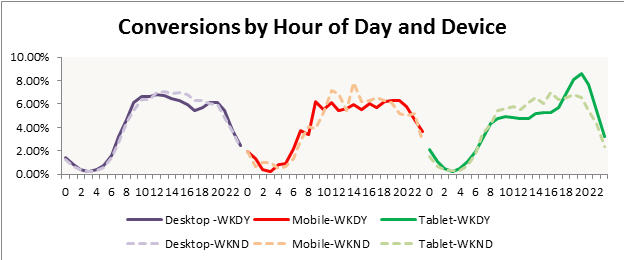The Christmas Jump, Tablet Hump & CPC Bump: Recent Trends In Mobile Usage
“I grab my tablet and get busy with the pen. Y’all could not be just like me if y’all was my twin.” –Andre 3000 That consumers are rapidly changing the way they interact with advertisers is no secret – but the rapidity in which they are doing so is quite surprising. As I looked into […]
“I grab my tablet and get busy with the pen. Y’all could not be just like me if y’all was my twin.” –Andre 3000
That consumers are rapidly changing the way they interact with advertisers is no secret – but the rapidity in which they are doing so is quite surprising. As I looked into the data from the last retail season three trends stood out.
Christmas Day Is The Early Predictor Of Tablet Traffic For The Next Year
Tablet impression-share has a distinct pattern. It spikes on the weekends when people are home and drops in the weekdays when people are on desktops in their offices. This five low, two high pattern is clearly seen in the chart below which shows the tablet impression share of paid clicks for a subset of retail advertisers.

However, note the spike around December 25 , Christmas Day. Tablet impression-share spikes and remains high until Jan 1. I noted the same trend with 2011 data. We found similar trends in the UK, too. This spike reflects the fact that many users get tablets as gifts during the holiday season, specifically around Christmas day.
What’s more, the impression-share around this time, sets the baseline for the next year until the next holiday season rolls around. Thus, while tablet traffic is growing every month, the bulk of the increase happens around Christmas.
Tablets Show A Very Distinct Hour Of Day & Day Of Week Pattern
We live in a multi-screen world with consumers using different devices at different times of the day and day of the week. The charts below reflect this trend.
During a typical weekday, desktop traffic is high during the working hours, notches down around 5 p.m. Most people leave work, and it picks up again early evening. In contrast, tablet traffic is low for most of the day but shows a distinct increase around 8 p.m. Smartphones, on the other hand, show no distinct trend.
In contrast, the weekend trends are quite different. No device shows a distinct pattern, and the distinct 8 p.m. tablet hump disappears. These trends reflect when and where these devices are being used – desktops in the office, tablets at home and smartphones everywhere.
Advertisers Have Taken Notice Of The High ROI On Tablets
Tablets have had lower CPCs than desktops despite the higher ROI on these devices. This was because advertisers had not caught on to the rapid adoption of tablets by consumers and their proclivity to convert on these devices. It now appears that marketers have taken notice of the trend.
In a sample we tracked, tablet CPCs were 17% lower than desktops in Q1 2012. By Q4, they were only 10% lower.
Key Takeaways For Advertisers
1. Tablets will account for 1 in 4 paid search clicks by the end of 2013.
Looking at historical trends and the Christmas day jump , one can anticipate that tablet traffic will account for 25% of all paid search traffic by the end of this year.
2. It pays to target to devices separately.
The varied traffic patterns on tablets , smartphones and desktops imply that advertisers should target these devices separately on search. Broadly targeting these devices with the same campaign means that one is leaving money on the table.
3. The tablet opportunity still exists.
Despite the rise, CPCs on tablets are lower than desktops. Given that tablets enjoy higher conversion rates than desktops, marketers should increase the investments on tablet targeted search campaigns.
The above trends highlight the rapidly changing surfing and purchasing behaviors of consumers on the Internet. While it is challenging for marketers to navigate this new ecosystem, it also opens up new opportunities. I hope the above trends enable you to make the most of this new multi-screen , multi-device world.
Contributing authors are invited to create content for Search Engine Land and are chosen for their expertise and contribution to the search community. Our contributors work under the oversight of the editorial staff and contributions are checked for quality and relevance to our readers. The opinions they express are their own.
Related stories
New on Search Engine Land

